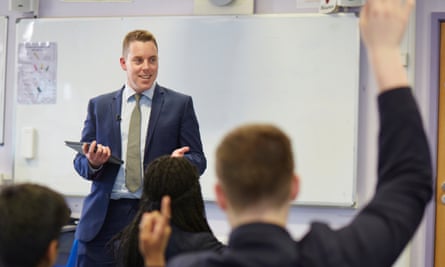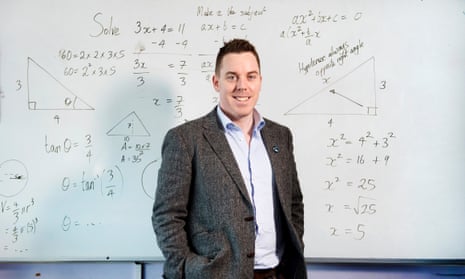At the back of Colin Hegarty’s classroom, on a display made from wavy pieces of blue sugar paper, is something he calls his “wall of inspiration”. It features photographs of famous people – Michelangelo, Malcolm X, Malala Yousafzai – alongside a quote from each stressing the critical importance in their own life and career of sheer, bloody-minded hard work.
“My secret is practice,” reads the contribution from David Beckham. “I have always believed that if you want to achieve anything special in life you have to work, work and then work some more.”
Hegarty loves talking to his pupils about people like Beckham, he says, and it is not difficult to see why. At 34, and after just six years teaching maths, he was this week named one of the 10 best teachers in the world in a contest that awards $1m to the overall winner, who will be announced in March. He is in the process of developing a website that he hopes will be available to every child in the country, and through which he aspires to make a difference to maths education in Britain.
But the one thing that has got him here – from the tiny flat in north-west London where he shared a bedroom with his parents and younger sister, via a first-class degree from Oxford and a stint as a City accountant – is what he refers to as “working like a dog”. So before he teaches a new class anything, he says, “I tell stories for a week in advance about how you have to work hard at everything in life, how you have to be prepared to dig in, how I have extremely high standards for you, so I’m not going to let you not do your homework, sorry.”

Hegarty doesn’t believe there is such a thing as being “good at maths” or, heaven forbid, bad at it. His father worked on building sites, his mother was a home help; neither gained any qualifications before leaving Ireland for Kilburn. But they both read with Hegarty and his sister when they got home from work, and there was always a space for him on the kitchen table to do his homework. “I was never wanting for Letts books – you know those Letts revision guides? If I wanted a book to help me, I got it, no matter what.”
It’s about establishing a culture of application, self-belief and support, he says. “Once that is sorted, you can do anything.”
It is half term at Preston Manor school – a large comprehensive in Wembley, north-west London – but it has hardly been the relaxing week that Hegarty and his wife, who teaches geography at another school nearby, had been expecting. Life, since he learned on Tuesday that he had been shortlisted for the Global Teacher prize, awarded by the philanthropic Varkey Foundation, has been a blizzard of television and radio interviews and a level of attention with which he is not terribly comfortable.
He is doing it, however, because his ambition for his website resource is as lofty as that for his students, and if he wants to roll it out more widely, “I know I’ve got to do a bit of this.” Just another task to which he must diligently apply himself.
Hegarty became an internet maths guru entirely by accident. Four years ago, an A-level student came to him with the news that his father was terminally ill and he would have to leave school for two months. “He said, ‘How am I going to keep up with my studies?’ Giving him the book wasn’t enough,” Hegarty says.
So the teacher sat down and Googled how to upload videos to YouTube, bought a tablet computer that would transfer his handwriting to the screen, and started recording short videos on the A-level syllabus, making them late in the evening “because it took a long time to learn how to do that stuff. I’m not good at technology as such – I had to learn.”
Within a month, Hegarty had recorded the entire A-level syllabus, and it occurred to him that the videos could have just as much value to the other students in the class. He instituted a “flipped learning” approach, in which pupils were expected to watch a video at home and class time was used to work through examples. “We just do maths for an hour. I don’t stand at the front and explain it at all,” he says.
What sounds like a cop-out for teachers is anything but, he adds. Watching at home allows children to go at their own pace, to pause and repeat the videos if they need to, to take time to make notes they actually understand. If students don’t have computers at home, there are hundreds available to them in the school. “I’m not going to accept that as an excuse,” Hegarty says.
The result was transformative for some students – an effect that he is now seeing much more widely as his new website, Hegarty Maths, is rolled out on a trial basis to 70 schools across the country. “Look at this kid. I love this so much,” he says as he loads the website on his laptop and brings up the profile of a 15-year-old student in Peterborough whose teacher contacted him this week.
The student was in the bottom set for maths in his year, but started using the website in December. Since then, bubbles Hegarty, he’s become “an animal for learning. He can’t get enough of it.” The site lets students watch videos by topic, revise the skills needed and sit a series of progressively more challenging tests. It’s not remotely revolutionary – and other sites are doing similar things – but it is clear, logical and unintimidating. The Peterborough student has already moved up two classes and will now sit the top papers at GCSE.
If Hegarty wins the Global Teacher prize – and the other shortlisted teachers are every bit as impressive – the prize money, paid in instalments, will probably be used to scale up the website. “I don’t know how I’m going to do that yet,” he says. “All I know is I can’t make kids pay for it.”
You really love teaching, I say. “Yeah,” says Hegarty with a grin. “I love trying to help children get that love of learning that I got. I think once you have that, the sky’s the limit. And I think [children] are really funny. They might make you emotional every now and then, but that’s life. It’s not … ” He mimes typing furiously with a blank face. “You feel at school.”
Colin Hegarty’s five tips to smash GCSE maths
The most important tip I can give. Believe in yourself
Get rid of the negative thoughts you have about yourself and maths. You can do it. If you work hard and you are dedicated, you are going to be successful in maths.
Don’t revise, practise
It’s not about sitting down to read a maths book, or make some pretty notes from the summary chapter. That’s not how you revise maths. The best thing to do is practise maths, by which I mean, do questions. And do questions on things you’re not good at. Work on the edge of your ability.
Always, always mark your work when you try exam questions
If you make a mistake, highlight the question and then use a different coloured pen to redo the question. If you don’t mark your work, what you have done is as useful as a chocolate teapot.
Start today, and do some maths every single day
Maths is one of those things you need to practise regularly. If you let up on your maths, you will probably go rusty and not do so well.
Register and sign up to a course
There are many free, online resources offering help and support with revision. As well as Hegarty’s site at mathswebsite.com, resources are available at studymaths.co.uk, themathsteacher.com, the BBC’s Bitesize website and others.
